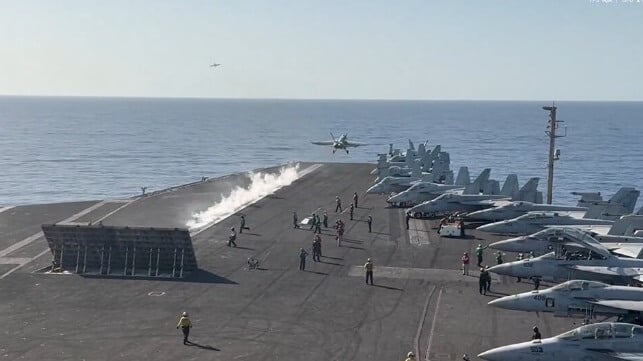Houthi Rebels Claim Responsibility for Loss of Second U.S. Fighter Jet

Yemen's Houthi rebels may have agreed to a ceasefire with the United States, but it appears to be off to a less-than-friendly start. On Wednesday, a Houthi spokesman said that the group had attacked the carrier USS Harry S. Truman on the day of the ceasefire announcement, causing the loss of a $60 million F/A-18 Super Hornet strike fighter.
"The naval and UAV forces of the [Houthi group] carried out a specific military operation targeting the U.S. aircraft carrier Truman and a number of its warships in the northern Red Sea with a ballistic missile and several drones," said spokesman Yahya Saree in a statement. "The operation resulted in . . . the thwarting of an air attack the American enemy was preparing to carry out on against our country [and] the downing of an American F-18 due to the state of confusion and panic the enemy reached during the targeting operation."
U.S. defense sources have confirmed that Truman lost an F/A-18 on Tuesday, the day of the ceasefire announcement. Anonymous sources close to the Pentagon told CNN and AP that the carrier's arresting gear failed, resulting in the loss of a plane during landing. Both pilots safely ejected and were rescued from the water.
Saree's claims could not be immediately confirmed, and have sometimes proven inaccurate in the past. If true, however, it would be the second F/A-18 loss attributable to Houthi action. Last month, an F/A-18 fighter rolled over the side from Truman's hangar deck elevator while the carrier was turning hard to avoid an incoming Houthi threat. The sudden maneuver was enough to send the unsecured aircraft overboard. One crewmember sustained slight injuries, but none were killed or pulled over the side in the incident.
Separately, Houthi leadership signaled Thursday that the group's attacks on Israeli targets will continue, and that the organization still considers the United States to be an adversary.
"The aggression against our people's interests proves that the Israeli and American enemies are enemies of our people in general," said top Houthi leader Abdul-Malik al-Houthi in a statement Wednesday.
Ramifications for Israel
Though it is a close U.S. ally, the Israeli government was not informed about the U.S.-Houthi ceasefire arrangement before the announcement, according to The Jerusalem Post. Israel is the Houthi movement's primary target, and the group has vowed to keep launching missiles and drones at Israeli territory; the White House's side deal with the Houthis has reportedly caused consternation for Israel's government.
"Israel will defend itself by itself," said Israeli prime minister Benjamin Netanyahu on Wednesday. "If others join us—our American friends—all the better. If they don’t, we will still defend ourselves on our own."
The agreement comes in the midst of U.S. bilateral negotiations with Iran, brokered by the Sultanate of Oman without Israeli participation. Iranian officials have quietly claimed responsibility for pushing the Houthis into a ceasefire in order to smooth the way for Tehran's nuclear-treaty negotiations with the White House. Iran is the group's primary sponsor.
“President Trump’s decision to halt attacks against the Houthis effectively leaves Israel alone in the campaign against the Yemeni terrorist organization,” said Danny Citrinowicz, research fellow at the Institute for National Security Studies, speaking to Times of Israel. “It is a further indication and reminder that the administration is working to realize its interests even if these do not coincide with the interests of the Israeli government.”
